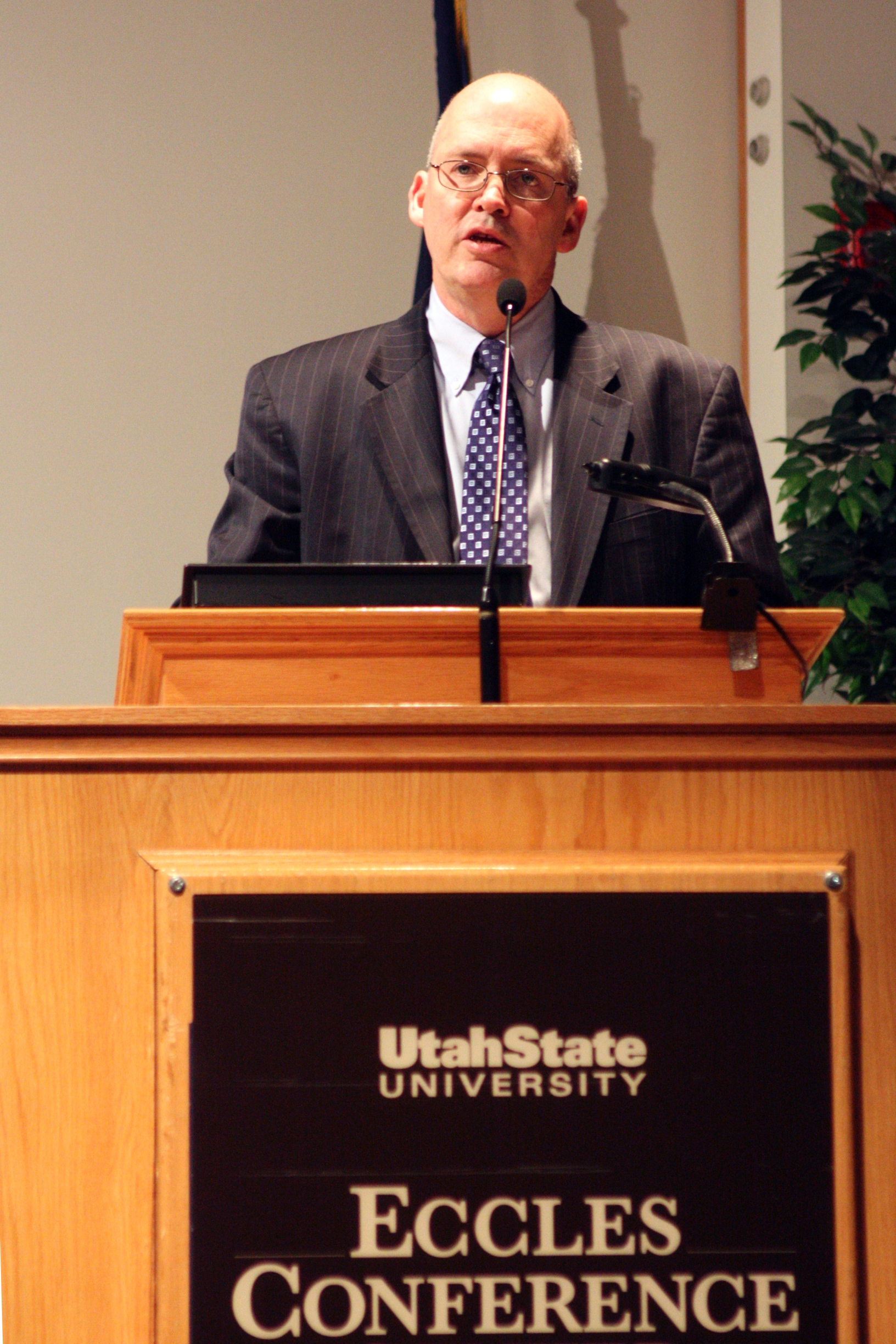Military defense spending is minimal, Schmitt says
The U.S. military needs to procure new equipment, said Gary Schmitt, director of the program on advanced strategic studies at the American Enterprise Institute for Public Policy research, in his lecture “Defending Defense: Why Cutting the Defense Budget Doesn’t Make Sense,” Friday.
The public lecture was given in the Eccles Conference Center to a group of about 60. The event was put on by professors Peter McNamara and Anthony Peacock of the political science department and was the first of two lectures on the future of the nation in the era of globalization. The lectures are given in conjunction with the Project on Liberty and American Constitutionalism, which is directed and co-directed by Peacock and McNamara, respectively.
Schmitt said the U.S. military is currently forced to use aging equipment that was deisgned and built in the ‘70s. Current pilots are flying the same planes their parents and grandparents flew in Vietnam, he said.
“The military now faces a recapitalization requirement at precisely the time the nation and its representatives are reluctant to spend money,” he said. “For soldiers, sailors and airmen, it has become the perfect storm.”
McNamara said one condition of a nation-state is that its in charge of its own defense, and Schmitt is a master of this and related topics.
“Dr. Schmitt is a very prominent commentator on national security and intelligence issues. He has a lot of experience.”
In response to criticism that the military has spent too much on equipment and technology rather than things that matter most in asymmetrical warfare, such as cultural intelligence, Schmitt said this was a serious criticism, but no longer valid.
“We’re American, so we’re not very good at being culturally aware,” he said. “The army was thought to have been the dumbest of organizations, but the truth is that the army has made a remarkable transformation. This is an institution that learned more quickly than any other major institution I know of.”
Schmitt also expressed concern about the rising influence of the Chinese military, saying that by cutting our military and adopting isolationist policies we are allowing security threats to grow.
“The People’s Republic of China has spent the past two decades modernizing its military at a pace we haven’t seen since the beginning of the cold war,” he said. “They have acquired a huge arsenal of new ballistic missiles, hundreds of advanced fighters and fighter bombers and air defense that is second to none.”
Nate Bartlett, a junior in the Air Force ROTC who attended the lecture, agreed with much of what was said, citing the personal effect the defense budget will have on his life.
“We’re doing our job, so why are we getting cut? That doesn’t make sense to me,” he said. “The amount of money we threw into the stimulus plan was uber-amounts over anything else. Of the things that money is being thrown at, we need to ask what’s working and what’s not.”
Bartlett was one of about 30 ROTC students that came for a bit of extra credit in their classes. But the lecture, he said, was more important than the credit.
“I’m sure that are many who think Schmitt is way off,” Bartlett said. “But whether you’re conservative or liberal, it’s important to further your knowledge about what’s going on.”
McNamara said helping students to become informed and take responsibility for the world they live in is one of the primary reasons for having these lectures.
“One small way students can do this is by coming to events like this,” he said. “Whether you agree with the speaker or not, that’s not the most important thing.”
In an interview following the lecture, Schmitt echoed the importance of students engaging in current events.
“Students are going to be citizens,” he said. “Our citizens. It’s understandable as a young man or woman that you’re just thinking about the next six months, but what you learn here will have consequences for your lifetime and your children’s.”
Walter Russell Mead, of Bard College and Yale University, will give the next lecture, which will discuss the economic and political aspects of globalization and will be held April 18.
–mike.burnham@gmail.com

